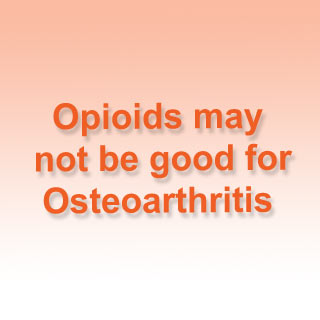
A few general side effects of opioid use are nausea, constipation and if used long-term, then drug dependence and withdrawal symptoms.
“We found that pain reduction with opioid treatment was small to moderate. Increasing the dosage did not appear to result in further pain reduction. However, patients taking opioids have large increases in risks of experiencing adverse effects and frequently stop taking opioids medications for this reason,†commented lead review author Eveline Nüesch, a research fellow at the University of Bern in Switzerland.
Nortin Hadler, M.D., a professor of medicine at the University of North Carolina at Chapel Hill and spokesperson for the American College of Rheumatology, mentioned, “It is striking how little additional benefit patients with hip or knee pain can expect from taking opiates compared to placebo. The advantage is arguably meaningful at best. However, the likelihood that unwanted effects are prominent is clearly meaningful.â€
About 10 studies were examined and it contained around 2,268 patients. The reviewers compared the effectiveness and safety of opioid pills and patches. The studies assessed differently the application of oral codeine, fentanyl patches, oral morphine, oral oxycodone and oral oxymorphone in severe osteoarthritis.
Nuesch remarked, “The effects of different types of opioids on pain relief and improvement of function appeared to be comparable.â€
While opioids reduced pain and enhanced function, the advantage was apparently small to moderate, and increasing the dose supposedly did not boost efficiency. Unfavorable events may result in a high rate of discontinuation, thereby making long-term use questionable.
The reviewers did not find any considerable distinction in the effects of the drugs as per pain-killing potency, daily dose, treatment duration or follow up. They were of the opinion that it may not be prudent to use opioids regularly for these patients, even when one is suffering from severe osteoarthritic pain
Hadler mentioned that whatever therapeutic advantage patients received from acetaminophen is much better than any other option in terms of risk/benefit ratio and cost/effectiveness ratio. He believed that opioids have no place in this clinical setting.
But Roger Chou, M.D., associate professor of medicine at Oregon Health and Science University in Portland, remarked, “Taking a broader perspective, NSAIDs and acetaminophen aren’t particularly effective for osteoarthritis, and other options are limited other than hip or knee replacement — which has its own risks and costs.â€
Chou added that it may still not be feasible to simplify that possible damage from opioid treatment may overshadow probable individual advantage. He mentioned that more study could assist in facilitating clinicians to better identify patients likely to benefit from opioids.
The review appears in the latest issue of The Cochrane Library, a publication of the Cochrane Collaboration, an international organization that evaluates medical research.
